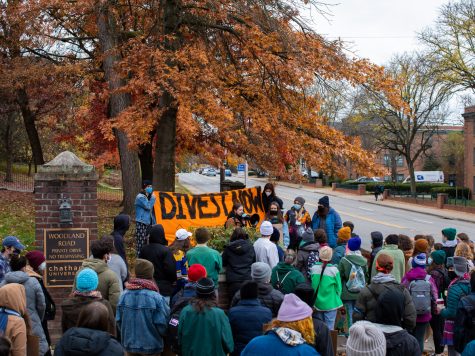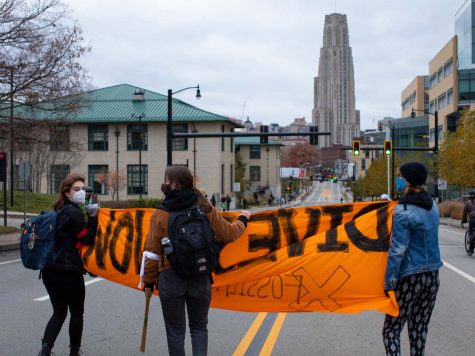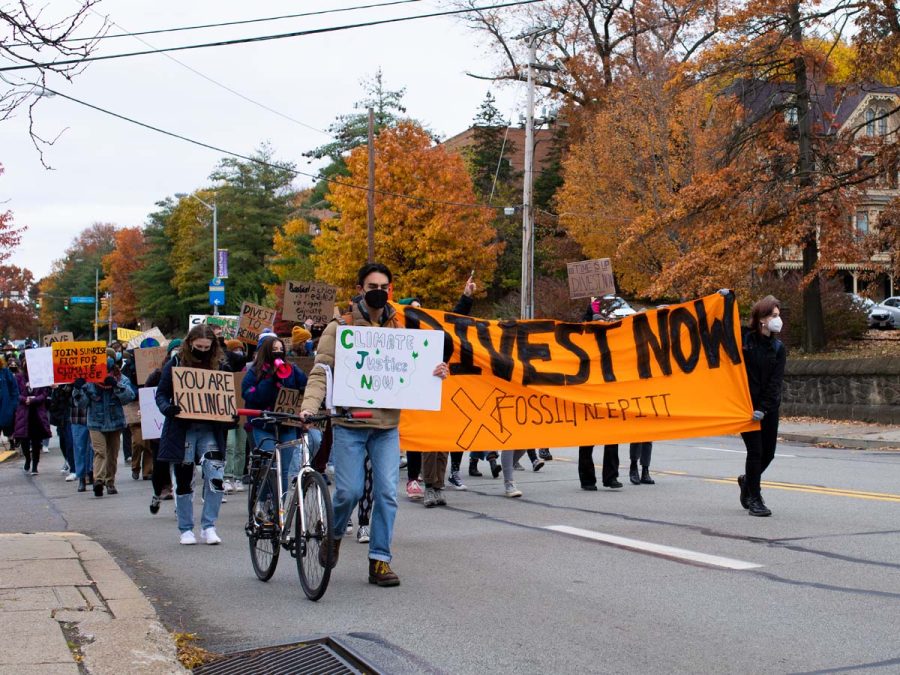Amid student push for fossil fuel divestment, Chatham encounters hurdles
University of Pittsburgh, Chatham University and Carnegie Mellon University students, march for their respective universities to fully divest in fossil fuels. Students chant, “Pitt, Chatham, CMU, divest now or shame on you!” Photo Credits: Kyle Ferreira
December 10, 2021
Chatham University has reduced the investment in fossil fuels from 5% in 2017 down to 1-2% of its 2021 endowment.
The news follows a campus push for divestment that occurred on Nov. 13 after a local, student-led march called upon Chatham University, Carnegie Mellon University and the University of Pittsburgh to fully divest in fossil fuels.
An endowment is a collection of financial assets that universities invest to support its education and research continuously, providing stability as income fluctuates year to year.

For Chatham, eliminating the portion that remains invested in fossil fuels is difficult because of the way Chatham must manage its wealth, according to Walter Fowler, vice-president of finance and administration at Chatham University.
Instead of investing in stocks, Chatham invests its endowment in funds and fixed-income bonds. The funds select many stocks to invest in based on what the whole stock market is doing, thus spreading out the risk associated with individual stocks. Fixed-income bond investments provide periodic payments which are known in advance, making bonds a less risky form of investment.
Chatham has direct control over the fixed-income bonds that the endowment is invested in.
“Just this past year, we said ‘there’s no reason why we can’t select bonds that are not carbon producing companies,’” Fowler said.
By eliminating carbon investments from Chatham’s fixed-income bonds and switching to funds that screen out carbon-producing companies, Chatham reduced its investment in fossil fuels down to 1 to 2%.
Most of Chatham’s remaining investment in fossil fuels is with Commonfund, which helps smaller institutions, like Chatham University, with their private equity investments.
According to Fowler, “When you invest with Commonfund, what you do is sign a contract to stay invested with them for the life of their fund.”

The life of the fund can last from 7 to 10 years, and there is a large financial penalty for leaving the contract early. This is the current problem Chatham faces with divesting in fossil fuels.
Larger universities with greater endowments, such as CMU ($3.1 billion) and Pitt ($2.4 billion), can invest directly in stocks. This gives them complete control over what they are investing in and allows them to specifically choose companies that are carbon neutral.
However, Chatham’s endowment, valued at $102 million, is considerably smaller than CMU or Pitt’s endowments. According to Fowler, there is too much risk involved when investing directly in stocks of specific companies due to Chatham’s endowment size.
As a result of investing in funds, Chatham can’t choose specifically what the endowment is being invested in. This limits Chatham’s control over how much of its endowment is invested in fossil fuels.
“We try to pick funds that have a good carbon divestment track record, but there’s some left over,” Fowler said.
This lack of control over the specific investments makes it difficult to determine an exact date by which Chatham can be completely divested in fossil fuels.

“The 1-2% in [Chatham’s] portfolio will go away over time because our commitment to Commonfund will go away over time,” Fowler said. “We would like to make a declaration that by ‘X’ date we’ll be carbon free, but we only want to make that declaration if we can stand by it.”
Fowler emphasized the importance of students advocating with companies that manage investments, like Commonfund, to make a change that can impact Chatham and other institutions that use outside companies to help them invest.
“If students advocated with Commonfund to divest with carbon producing assets, that could be really powerful,” Fowler said.








